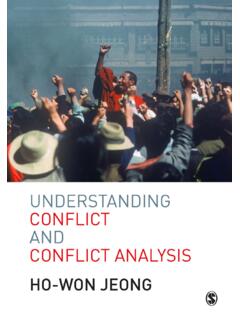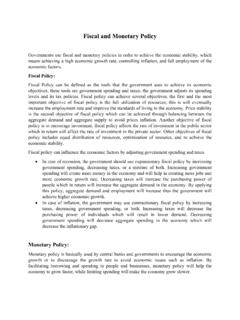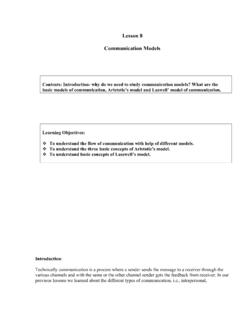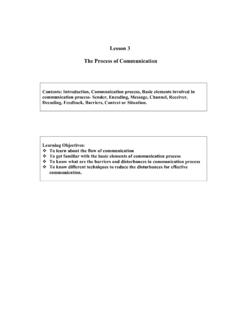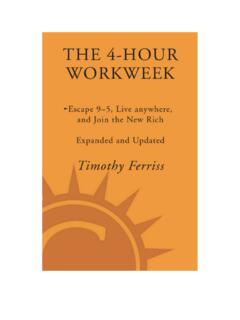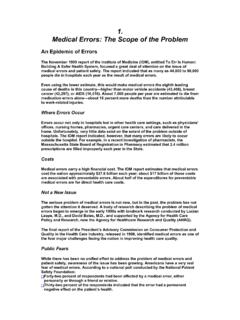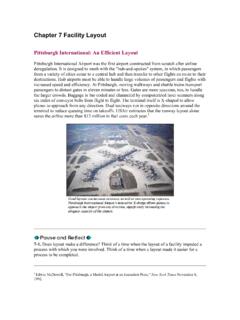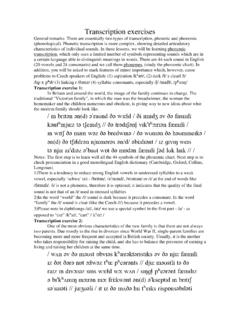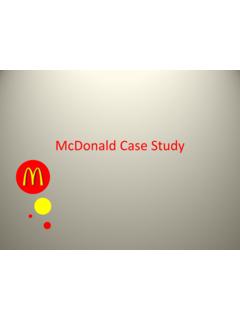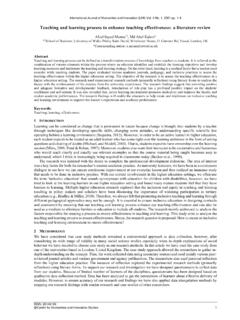Transcription of Language Register and Why It Matters (Or: Why You Can’t ...
1 Language Register and Why It Matters (Or: Why You Can t Write An Academic Paper in Gangsta Slang) Dr. Sarah Elaine Eaton Language Register is the level of formality with which you speak. Different situations and people call for different registers. This is a concept I was talking about recently with some of my graduate students who dislike the idea of writing with a formal tone. They were commenting that they preferred to write in a conversational tone. Since our class is about learning to write up their academic research, I countered by saying that a manuscript submitted to a peer -reviewed journal was less likely to receive a favorable response from the editors if the tone was too conversational.
2 Some of them were unfamiliar with the concept of Language Register , so I gave them a quick overview based on Joos (1967) definitions: Frozen or static Register At this level, Language is literally frozen in time and form. It does not change. This type of Language is often learned and repeated by rote. Examples include biblical verse, prayers, the Pledge of Allegiance, and so forth. Formal Register This style is impersonal and often follows a prescriptive format. The speaker uses complete sentences, avoids slang and may use technical or academic vocabulary.
3 It is likely that the speaker will use fewer contractions, but opt instead for complete words. (Example: have not instead of haven t ). Writing expert Rita Mae Brown might argue that a writer or speaker is more likely to use vocabulary with Latin or Greek roots at this Register . For example, the writer of a scientific article may be more likely to use the word female (Latin root) than woman (Anglo Saxon root). This is the Register used for most academic and scientific publishing. Consultative Register This is the Register used when consulting an expert such as a doctor.
4 The Language used is more precise. The speaker is likely to address the expert by a title such as Doctor , Mr. or Mrs.. Some sources say this Register is the formal Register used in conversation. Casual Register This Register is conversational in tone. It is the Language used among and between friends. Words are general, rather than technical. This Register may include more slang and colloquialisms. Rita Mae Brown might say that at this Register , speakers are more likey to use vocabulary words with an Anglo Saxon or Germanic root.
5 Her book Starting from Scratch: A Different Kind of Writers Manual has an impressive list of (pp. 63-65) English vocabulary words that have an Anglo-Saxon or Germanic root, and their Latin root counterparts. Intimate Register The Language used by lovers. It is also the Language used in sexual harassment. This is the most intimate form of Language . It is best avoided in public and professional situations. Why it can be harder for English speakers to understand differences in Register Unlike French, Spanish, German and other languages, English does not have different pronouns for addressing others in different registers.
6 For example, Spanish has usted for formal and consultative Register and t for casual and intimate Register . I never quite understood why one would address dieties with the informal t , but that seems to be what is used at the frozen Register , too. Nevertheless, modern English simply has you . That wasn t always the way. We used to have both formal and informal forms of you in English. You was the formal way to address another, not the informal, as many people believe. Thou was informal. For example, Juliet addresses her lover informally with the famous line, O Romeo, Romeo wherefore art thou Romeo?
7 (Romeo and Juliet, Act II, Scene 2). Over time, we dropped our informal thou and opted instead to use the formal you in all situations and with all speakers. So, we ended up with one way to speak to everyone. That leaves Native English speakers who have never learned an additional Language at a disadvantage when it comes to learning and understanding Register . There can be an assumption that all situations and all people are created equal. Needless to say, that assumption is false. According to researchers such as Craig Storti (2001), Canadians tend to be culturally informal.
8 They are more likely to address their boss by their first name and use a casual Register more than any other. This does not mean, however, that Canadians (or anyone else, for that matter ) are exempt from learning other registers and knowing when and why to change registers. The importance of knowing when and how to move between registers A speaker may move from one Register to another with ease. For example, it is not uncommon for Canadian teachers to address one another casually in the staff room, and then adopt a more consultative Register when speaking with a parent or school board trustee.
9 If one Register is expected and another is presented, the result can be either that offense is taken (or intended) or a comic response. For example, on the TV show Big Bang Theory , Sheldon s character often uses the higher consultative Register with his friends, as well as everyone else. He sometimes seems stuck in the world of high-level vocabulary, unable to speak in the lower casual Register that his friends use among themselves. The result is comedic. The audience laughs at his social awkwardness and inability to understand that he can (and should) adapt his speech to different contexts.
10 In contrast to Sheldon s academic speech, some researchers have found that those living in poverty are more likely to be stuck at the casual Register . They are less likely to have developed the skills at the consultative or formal Language registers. Or if they do know how to use the higher registers, it feels inauthentic to do so, like wearing a suit that does not fit properly. As a result, those living in poverty may disregard the higher registers or simply refuse to use them in their speech and writing. This, in turn, may inhibit them from advancing in their work and ultimately, getting out of poverty.
